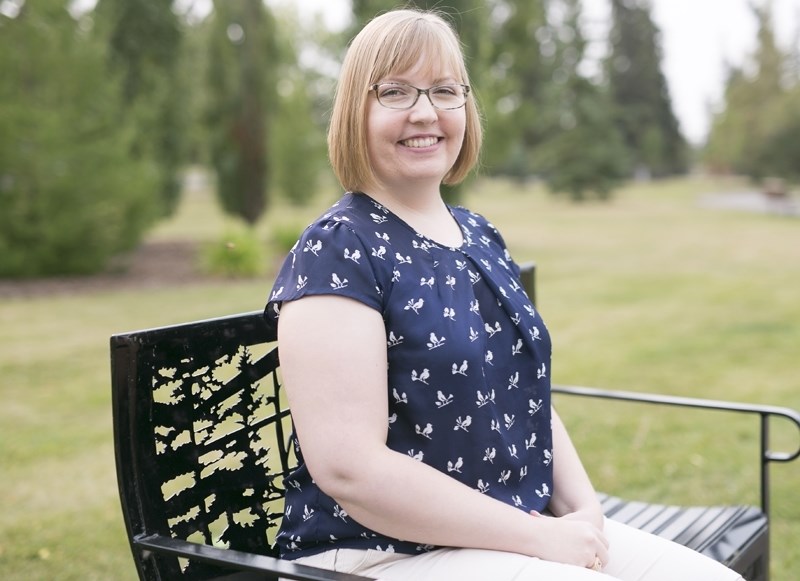It seems Jennifer Jackson was destined to be a nurse.
When she was four years old, she lived next door to a Red Deer College nursing instructor.
"Jennifer thought Cora Lee was the most amazing person in the world," said her mother Pauline Jackson.
One day, she returned home from a visit in tears. It turned out that the professor was retiring, and Jennifer was heartbroken that her favourite neighbour wouldn't teach her to be a nurse.
"So Cora Lee had me over for nursing lessons," said Jackson. "She had set up different stations in her basement: how to open a Band-Aid without touching the sterile gauze; how to pour pills out of a container ñ we used M&Ms. There was a stethoscope and I could listen to my heartbeat."
"She said 'OK, now I've taught you how to be a nurse, so even though I am retiring, you can say that you got nursing lessons from me,'" said Jackson.
"That started it."
Some 25 years later, Jennifer Jackson is an experienced critical care nurse with a master's degree, now working on a PhD in nursing research, and was presented with the Rising Star award from Athabasca University last month, for her contributions to the field.
"I had never forgotten that experience with Cora Lee," said Jackson, who graduated from Olds High School in 2005. When she was deciding what to study in university, she put out a few applications, including one for the nursing program at St. Francis Xavier University in Nova Scotia.
"I jokingly said to my mom, whatever comes back first Ö" said Jackson.
"I got this large envelope from St. FX," she said. "Before I even opened it, I just held the envelope in my hands, and I just had this very clear sense of, this is what I need to do."
After finishing her degree, Jackson moved to Ottawa and began work as an intensive care nurse. She discovered the job was challenging, but not in the way she had expected.
"I found that it was very, very emotionally difficult," she said. "The challenge that made me think ëI can't do this' was never the intellectual challenge."
She began asking colleagues how they managed the emotional aspect of the job, but discovered they didn't have hard and fast answers.
"I think they all had their own strategies, but it was hard to put into words for someone else," she said.
What she noticed was that some nurses had done this kind of emotionally taxing work for 30 years and still loved it, while some became cynical over the years. Jackson wanted to know why.
She decided to pursue a master's degree to find out, and chose a distance education program at Athabasca University.
"Part of the reason I was drawn to Athabasca was that amongst nurses it has an incredibly positive reputation," she said about the AU program that allowed her to keep working while she studied.
"I know that that stigma is out there," she said about the idea many hold that distance education offers lower quality learning. "They are misguided."
"For me it was obvious right from the beginning that the calibre of the program was very good," she said, "because I felt stretched, but also supported."
"I gained an understanding of nursing politics across the country," she said. "I would have never had that experience, if I hadn't been able (to learn) from a distance program."
Jackson's research looked at how nurses in critical care go through a process of being resilient, but she said the project ended with a few answers and many more questions.
So she considered continuing with a PhD, and looked into the program at King's College London, one of the best in the world.
"Initially I thought this is probably a bit of a pipe dream," she said. "But it's at least worth asking for some information."
Turns out, the university had just opened their Centre for Applied Resilience in Healthcare, and the very day that she contacted them they had received the go-ahead to fund one international student. The stars aligned.
"I wasn't immediately planning to move to London after finishing my master's," she said, "but I know enough to know that when you have that kind of opportunity, the answer is ëyes.'"
This past May, AU called Jackson to tell her she had been nominated for its Rising Star award, which is presented to alumni who have made significant contributions in their area of expertise. In fact, it was one of her classmates ñ whom she didn't meet in person until years after they graduated ñ who put Jackson's name forward.
"To be nominated by one of my peers was very moving for me, and I am so grateful for that," said Jackson.
Athabasca hosted a presentation banquet for Jackson at the Olds Pomeroy Inn & Suites on Aug. 24. And yes, Cora Lee was there to honour her former "student."
"All kinds of different community members, friends, neighbours, family, were all there, and I was just touched beyond what I could say," said Jackson.
"For me it was less about celebrating what I had done, and more about saying I came from such a strong community and all of these people invested in developing my leadership skills," she said.
"I am happy to come back and tell them how thankful I am, and how I am using that investment, and hopefully honouring all the efforts that they made to support me while I was growing up."
MORE: You can find out more about Jackson's research at jenniferjacksonRN.org.
"For me it was less about celebrating what I had done, and more about saying I came from such a strong community and all of these people invested in developing my leadership skills."JENNIFER JACKSON



